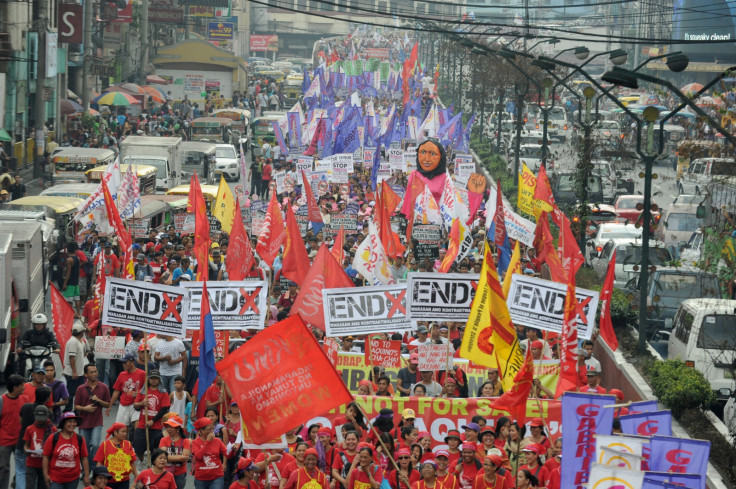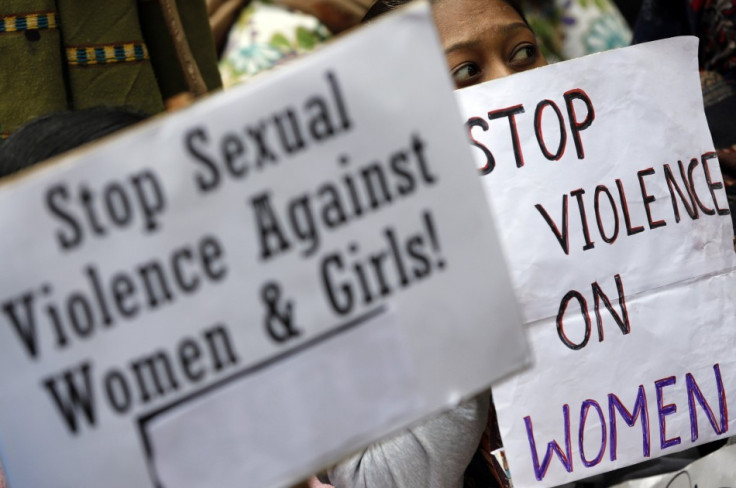International Women's Day 2015: How far have the rights of females progressed?

It was in a grimy Copenhagen meeting hall over a century ago when 100 women from 17 countries unanimously approved the idea of a day that would celebrate and push forward the rights of women. Millions of women around the world on 7 and 8 March will mark the day with events, marches and protests to honour the social, economic and political achievements of women, while calling for greater equality.
Make It Happen is the theme for 2015, encouraging effective action for recognising women and advancing their rights. In the past 100 years, the day has been a platform for a number of issues, from women's suffrage to more women in the workplace. Yet the latest statistics on women's rights in Britain and around the world suggest some undoubted advances over the past century have now been stalled, or even worse, reversed.
Violence
The violence disproportionately faced by women is a tangible concern. A third of women worldwide have experienced physical or sexually intimate partner violence or non-partner sexual violence – and around three million women in the UK suffer rape, domestic violence, trafficking and other violence every year. More often than not, cases of violence against women go unreported.
Although women's freedoms in Britain are evident and something to be celebrated, a large number of women are still coerced into forced marriages. In 2005, the Forced Marriage Unit was set up as a body between the Home Office and the Foreign & Commonwealth Office, with the aim of providing support and advice to victims of forced marriage.
Only statistics for 2012 and 2013 are available, in which the FMU was required to give advice or support to possible forced marriages in 1,485 cases and 1,302 cases respectively. At first glance, this suggests the number of forced marriages is decreasing but the unit only deals with cases it is made aware off – so the true scale of the issue is unknown.

"The UK leads the world in tackling forced marriage, including early and child marriage. It is an appalling and indefensible practice and is recognised in the UK as a form of violence against women and men, domestic/child abuse and a serious abuse of human rights," an FCO spokesperson told IBTimes UK.
"There is no culture in which forced marriage should be acceptable. Victims can suffer physical, psychological, emotional, financial and sexual abuse including being held unlawfully captive, assaulted and repeatedly raped."
Women in power
Women are dramatically under-represented in positions of power and influence in the UK – particularly in politics. Currently, men outnumber women four to one in parliament and just 22% of MPs are women. Progress is moving at a glacial pace and in the past 15 years, the number of female MPs has increased by just 4.1% - leading to a significant democratic deficit.
I received a letter from the ministers that said that as far as they are concerned, because the pay gap is at a historic low, it is enough to be complacent about. But I mean, 19.1% - it's unbelievable isn't it? It's extraordinary. The gap is still there
Britain has slipped down the global league table of women's representation – Sex and Power 2014 – so extensively that it is now behind most of its European counterparts, including Spain, Germany, Italy and France. It is also behind Madagascar and Kyrgyzstan.
In Britain, although the pay gap exists, there are signs that it is closing. Last November, the government announced that the gap was at 19.1% - its lowest point in history. Still, over 40 years after the Equal Pay Act came into force in the UK, women still face a stark gap in their earning compared to men's. They experience one of the highest pay gaps in the UK – as men continue to work in better paid sectors than women.
Labour MP for Rotherham Sarah Champion, whose recently proposed bill that required companies with more than 250 employees to be forced to publish details of any gender pay gaps, told IBTimes UK in an interview: "I received a letter from the ministers that said that as far as they are concerned, because the pay gap is at a historic low, it is enough to be complacent about. But I mean, 19.1% - it's unbelievable isn't it? It's extraordinary. The gap is still there."

Poverty
Hardship and challenges faced by women in Britain can seem almost insignificant when compared with those tackled daily by those living in countries blighted by poverty, oppressive regimes and institutionalised misogyny.
Women are the world's primary food producers, yet cultural traditions and social structures often mean women are much more affected by hunger and poverty than men. According to the World Food Programme, females in Asia and South America are more likely to go hungry than men because they often have unequal access to resources, education and income – and because they participate less in decision-making.
Different manifestations of violence and discrimination against women and girls exist in different countries, and some are significantly interlinked
Entwined in the issue of hunger, more than a billion people in the world today live in poverty – the great majority of whom are women in developing countries. The "feminisation" of poverty is an enduring global problem – there are 31 million girls of primary school ages out of school. Of these, 17 million are expected never to enter school.
Although many countries have banned FGM, the practice is still widely carried out. Around the globe, 130 million girls and women have undergone FGM and every year, a further three million girls are at risk in Africa alone. In the UK, 65,000 girls a year are at risk of being cut.
"Different manifestations of violence and discrimination against women and girls exist in different countries, and some are significantly interlinked," Antonia Kirkland, of the human rights NGO Equality Now, said. "Domestic violence for example, may be more prevalent in one country, while female genital mutilation or child marriage may be more common in another.
"Many countries have laws banning FGM or child marriage but implementation is patchy or there are exceptions in the law that are not in the girls' best interests, for example where a male guardian or judge can consent to her marriage below the age of 18. Ending all manifestations of violence and discrimination against women and girls means ensuring legal equality as a first step."
© Copyright IBTimes 2025. All rights reserved.






















